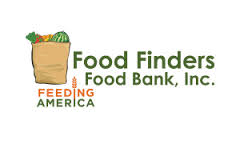
Nationally, seniors with the lowest incomes are most at risk of being food insecure, yet about two-thirds of food-insecure seniors have income above the federal poverty line. As a result, many seniors likely do not qualify for federal nutrition programs like the Supplemental Nutrition Assistance Program (SNAP) or the Commodity Supplemental Food Program (CSFP).
“Food Finders wants to make sure that low-income senior citizens in our community are aware that there is food assistance available for them,” shared Katy Bunder, CEO at Food Finders Food Bank, a member of Feeding America. “It is heartbreaking to think of senior citizens not having enough food to stay healthy. Food Finders is working to provide food to seniors facing hunger through our Senior Grocery Program and the Commodity Supplemental Food Program.”
The issue of food insecurity among the elderly is larger than the lack of access to nutritious food alone. Research also demonstrates that food insecure seniors are at much greater risk of being diabetic, suffering from depression, having congestive heart failure, experiencing a heart attack or having asthma than food-secure elders.
“Many Older Americans encounter a myriad of issues the general population does not face, including health conditions, transportation challenges, and physical limitations,” said Feeding America President Matt Knott. “At Feeding America, we are looking at ways address food-insecure seniors’ unique needs, so that they can live fuller, more food-secure lives, with as much dignity and independence as possible.”
This latest report documents the characteristics of seniors who struggle to meet their nutritional needs. Specifically, in 2016, researchers found:
- Seniors who are racial or ethnic minorities, low-income or younger vs. older (age 60-69 vs. age 80+) were most likely to be affected by some level of food insecurity.
- Seniors who reported a disability were disproportionately affected, with 24 percent reporting food insecurity.
- Senior food insecurity rates vary by state, ranging from 3.4% in North Dakota to 14.1% in Louisiana. Indiana, with 9.9% of seniors food insecure, falls in the middle of that range.
The State of Senior Hunger in America in 2016 was produced by Feeding America in partnership with NFESH. The study was conducted by researchers Dr. James Ziliak and Dr. Craig Gundersen and is the source for national- and state-level information about food insecurity among seniors age 60 and older. The full report can be found here.
About Food Finders
Since 1981, Food Finders Food Bank, a member of Feeding America, has worked to provide full service programs that meet the nutritional needs of thousands of hungry families in North Central Indiana. The food bank operates programs to cost-effectively secure donated and purchased food, provide food to families in need, and educate the community about the efficient use of food resources. Food Finders distributes more than nine million pounds of food annually; throughout the 16 counties it serves. For more information or to make a donation, contact Food Finders Food Bank, Inc. at 765.471.0062 or visit www.food-finders.org.
About Feeding America
Feeding America® is the largest hunger-relief organization in the Unites States. Through a network of 200 food banks and 60,000 food pantries and meal programs, we provide meals to more than 46 million people each year. Feeding America also supports programs that prevent food waste and improve food security among the people we serve; educates the public about the problem of hunger; and advocates for legislation that protects people from going hungry. Individuals, charities, businesses and government all have a role in ending hunger. Donate. Volunteer. Advocate. Educate. Together we can solve hunger. Visit www.feedingamerica.org, find us on Facebook or follow us on Twitter.
